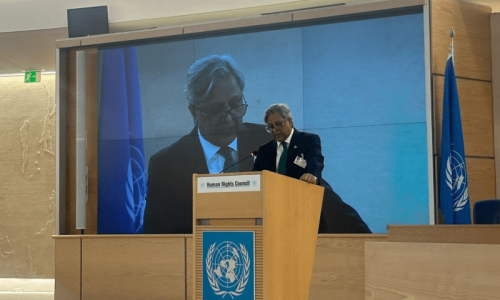No other option but to implement IMF programme: PM Shehbaz

Prime Minister Shehbaz Sharif said on Tuesday that the government had “no other option” but to implement the International Monetary Fund (IMF) programme, calling it a “painful reality”.
Pakistan entered a $6bn IMF programme in 2019, which was increased to $7bn earlier this year. The programme’s ninth review is currently pending for the release of $1.18bn. It had earlier been put off for two months due to the PML-N-led government’s unwillingness to accept certain conditions placed before it by the Fund, and the disagreements have yet to be resolved.
Earlier this month, IMF Resident Representative for Pakistan Esther Perez Ruiz had said that discussions between Islamabad and the international moneylender on the ninth review had been “productive” so far.
Speaking at a press conference in Islamabad today, the premier said that the country had no other option but implement the IMF programme and criticised the PTI for breaching its agreement with the international lender.
He lauded the nation for braving the burden of the price hike with patience.
PM Shehbaz also regretted that the government could not provide subsidies to any sector without approaching the IMF, saying that it was a “painful reality”.
‘Solarisation only option for survival’
During the press conference today, the prime minister revealed that the government had devised a plan to immediately convert all the federal government entities’ buildings to solar power by April to slash a huge chunk out of the country’s costly fuel import bill hovering around $27 billion.
Unveiling the details of the plan, he said the procedures for conversion of solar power should be fast-tracked as they had set April 2023 as the timeline for the implementation of this plan.
“Consider it as our political, social, national, and religious duty to implement it as soon as possible.”
PM Shehbaz highlighted that under the plan, all the federal government ministries, departments, authorities, and their offshoots in the provinces would immediately shift to solar energy.
He asserted that the project would be a model for the rest of the provincial governments as the federal government would not make additional expenditures over the solarisation process.
The prime minister said that with these urgent measures, the government would be able to generate 300MW to 500MW of cheap power, thus reducing the import bill worth billions of dollars each year.
He assured that the whole process would be conducted through transparent bidding via a third party, urging provincial chief ministers to emulate the federal government’s launched pattern and introduce solar systems in their respective provinces.
“It is the only option for our survival as a nation,” he added.
The prime minister said the process for the generation of 10,000MW solar power in the country had already commenced and such a conversion by the federal government buildings would be the first phase.
‘Pakistan bearing the brunt of international fuel, gas prices’
Enumerating the economic challenges faced by the country due to skyrocketing fuel and gas prices after the Russia-Ukraine conflict, he said developing countries like Pakistan had to bear the brunt.
PM Shehbaz said that the $27 billion costly fuel import bill was a big challenge for countries like Pakistan, adding the ongoing conflict had also surged prices of gas and worsened its availability as the supply to Europe was disrupted.
The prime minister said that during the Covid pandemic, the prices of gas crashed to the lowest and it was sold at $2 per unit, but the then government committed criminal negligence by not securing its import and now the whole nation had been suffering because of that decision.
He recalled that during former prime minister Nawaz Sharif’s tenure, a 15-year agreement for the purchase of LNG at 13.2 per cent of the Brent was reached with Qatar, but unfortunately, it was politicised by the previous government.
“Now, due to the global situation, gas is not available while fuel is being sold at an exorbitant price in the global market,” he said, adding that authorities would have to convert to solar and renewable energy with lightning speed.
‘No development should be expected on prices’
The prime minister said that the past governments had not carried out reforms that swelled the circular debt and costly power generated.
He cited issues like power theft, transmission losses, and expensive fuels as the reasons behind power production, saying that circular debt in the power sector had reached to whopping Rs2.5 trillion.
PM Shehbaz regretted that lack of responsibility and the backlog of years had turned the circular debt into a huge mountain. “Those governments had committed negligence that did not introduce reforms to reduce the circular debt”.
He said the federal coalition government was an eight-month nascent one facing a mountain of challenges that kept on piling for decades and expressed the resolve to slowly and gradually overcome these with commitment.
Referring to current economic challenges, the prime minister pointed out that the entire nation was expecting them to give them respite from the price hike.
He maintained that no development should be expected when the government had to pay $27 billion on expensive fuel and spend their local resources on its import.
“Only through the conservation of their resources in a proper manner like solar and renewable resources, they would be able to generate inexpensive electricity,” PM Shehbaz concluded.













































